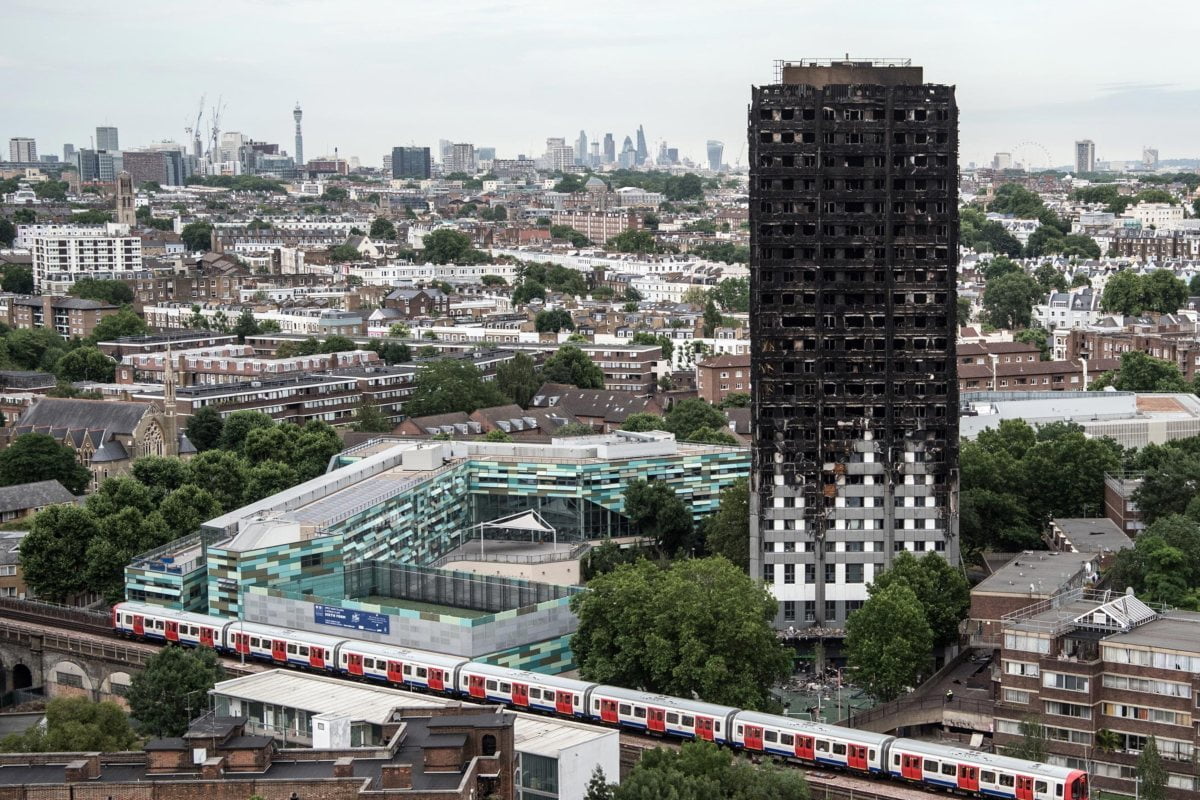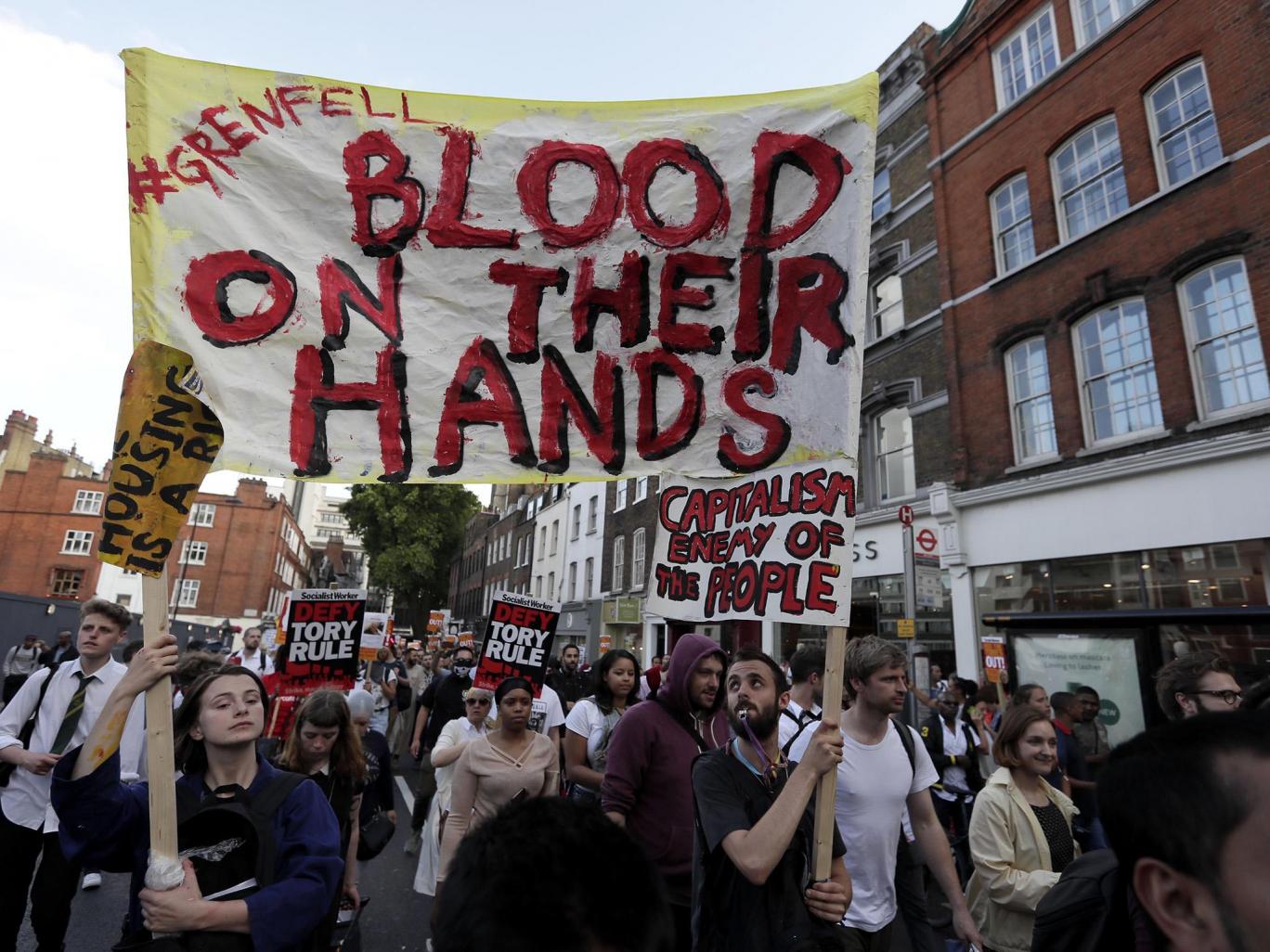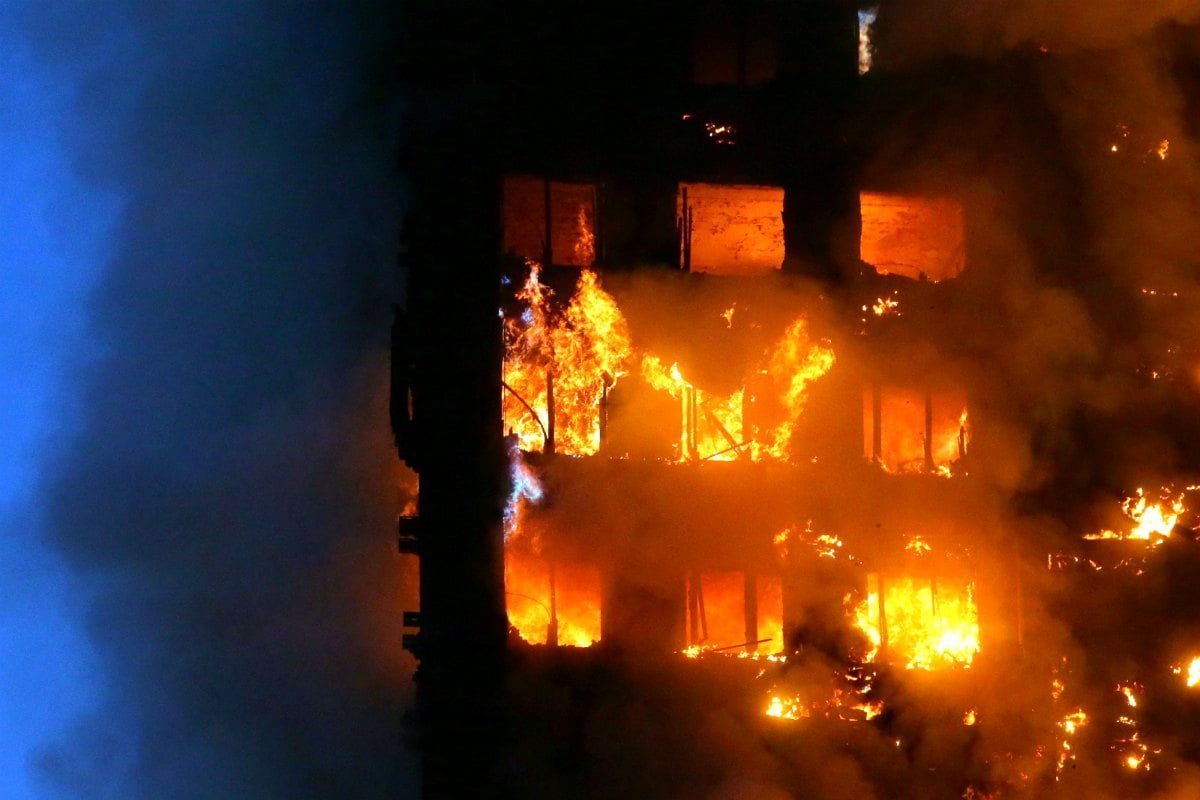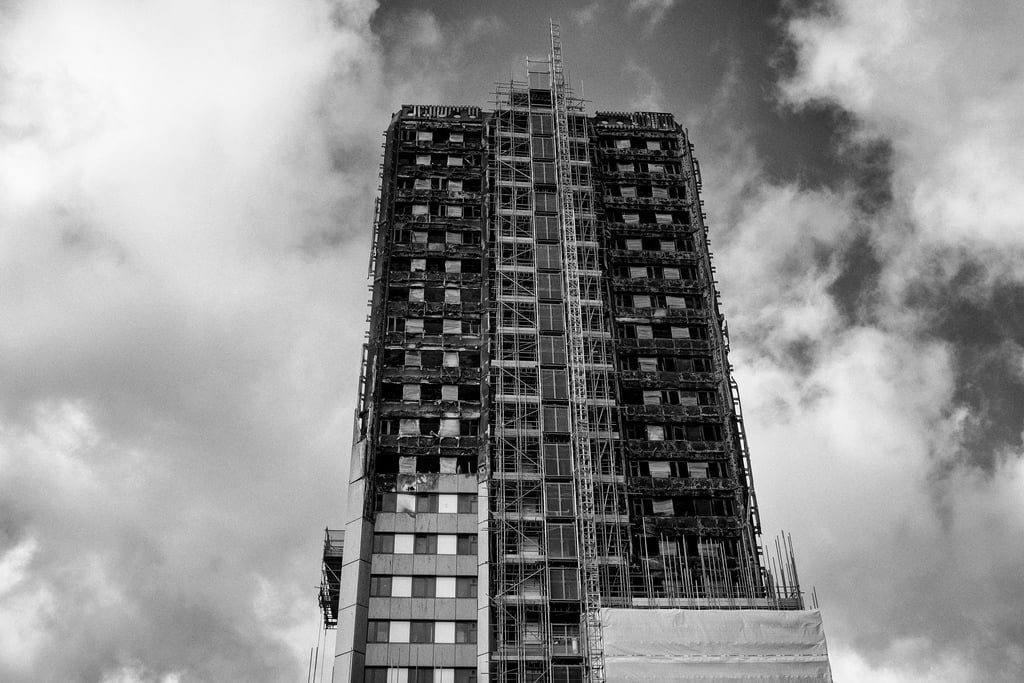One year on from the Grenfell disaster, and everyone is demanding change to ensure that such a tragedy never happens again. To do this, we need to change the system.
The tragedy of the Grenfell fire was the result of a multitude of injustices that still play out across the UK. These are as varied as immigration policy, a lack of social housing, rising rent, unemployment and poverty. But they share a root cause: capitalism – an economy run for profit not people.
The scale of the fire was wholly preventable. What was a small electrical fire spread to an inferno because flammable cladding insulation was used and poorly fitted. This cladding was known to be unsafe even before it was used in the refurbishment of Grenfell.
In 2013, a fire that spread in the same way killed six people in Lakanal House, in Camberwell, London. The resulting inquiry deemed that cladding unsafe. In the year leading up to the Grenfell tragedy, the London Fire and Emergency Planning Committee lobbied the government to enforce the recommendations of the Lakanal House inquiry.
Emma Dent Code, the Labour MP for Kensington, who sat on the inquiry committee, stated that, “If the Lakanal House inquiry recommendations had been implemented, Grenfell Tower would not have burnt.”
The Tory government, heartlessly committed to austerity, has already refused to enforce safe housing measures, even after the loss of lives has proved these necessary. Despite declarations of sorrow from the Tories, cutting costs and protecting big business will always take priority. We cannot trust that the Grenfell inquiry will have any effect.
Those responsible must be brought to justice. At least 72 people burned to death in a violent fire that could have been prevented. Yet nobody has lost their job over this scandal, let alone been arrested.
Profit before lives
In 1985, Margaret Thatcher tore up the 306 page book on building regulations, replacing it with an 24 page document. This document allowed the construction industry to interpret what safety means. Because big business is ultimately only concerned with its bottom line, the outcome of their interpretation is inevitably about saving costs and maximising profit. Meanwhile, safety is neglected. The bosses of these parasitic companies have blood on their hands.
Within four days of the Grenfell fire, the government rushed to argue that the cladding was banned and should never have been on the building. Contractors claimed it was legal.
The official inquiry into the disaster only started in April. The three companies responsible were woefully absent. Regardless of the outcome, we know that the government didn’t do what was within its power to ensure safer housing – they are also responsible for the needless deaths.
While this debate continues, the very same flammable cladding coats tower blocks across the country. One or two individuals or organisations may eventually receive token prosecutions. But the fact remains that it is the profit system that is to blame. Legal regulation remains toothless.
The dangerous cladding has been found (and failed fire safety tests) on almost 300 social housing tower blocks. You would think that our leaders would rush to correct this. But one year on and this cladding remains on all but three buildings.
Fear and outrage
 We spoke with Julie and Nicole, who live in one of the nine social housing blocks in Salford that do not have fire-safe cladding. Despite promises that the cladding would be replaced in March, they have now been told it will be another two years until their homes are made safe.
We spoke with Julie and Nicole, who live in one of the nine social housing blocks in Salford that do not have fire-safe cladding. Despite promises that the cladding would be replaced in March, they have now been told it will be another two years until their homes are made safe.
The fire alarm had been triggered the night before our interview. It was a false alarm, but they were both visibly shaken by the event.
Nicole told us that, “you can’t actually hear the fire alarm in the living room. I’ve slept through it before”. They only knew there was a fire scare because Julie went into another room to feed her pets. If there was a real fire, only chance would decide whether or not they knew in time.
Julie feels a responsibility to her community. “Every day, I go to sleep – when I do sleep – and I’m looking at all those to make sure they’re safe.” She looks out of the window at the other flats surrounding her, each one of them a fire risk.
Those who manage the area have mimicked the government’s response over Grenfell – keeping those involved in the dark. “We heard from the Salford Star online that our homes were not safe, that we could literally be murdered,” Julie tells us.
“There’s no transparency, we don’t know what’s gone on. We had the mayor come to us last year after Grenfell in a few meetings, and that’s been it. They seem to think that’s it now, you can live with it. We’re not even being told if we’re getting sprinklers fitted!”
The lack of social housing reduces the choices they have. Moving to somewhere safer isn’t an option. “If I moved now, I’d have to have a one-bedroom, with two cats, four guinea pigs and a fish tank, and they’re just not big enough.” Even within their homes they have no autonomy. “We’re not allowed to open the windows.”
They are both outraged at the government’s response to Grenfell. Nicole says, “It’s disgusting, those people haven’t been homed. I can’t stand this Tory government, I’m not a violent person but give me a machine gun!”
Theresa May promised that everyone made homeless by Grenfell would be rehoused in the local area within three weeks at the very latest. After months of living in B&Bs, this promise remains unfulfilled.
Julie highlights the hypocrisy of the Tories. “The government are telling us they’ve got no money to make us safe, but they’ve got money to bomb.”
They struggle to see who can help them. “The council are making us live like this, but it’s not their fault. Their hands are tied.”
Grenfell was in a Conservative-led council – betrayal is almost expected. Salford, however, has had an overwhelming Labour majority since the 1970s. Labour councils have to step up and break free of ‘tied hands’. Rather than carrying out Tory austerity, Labour councils must fight against it, alongside people like Julie and Nicole.
Only last month, Theresa May announced she would finally direct £400 million to replacing the cladding. However, that money is coming straight out of the Affordable Homes programme. This epitomises how the capitalist economy cannot provide for our basic needs. We shouldn’t have to choose between affordable housing and safe housing – especially when big business control gigantic hoards of housing stock, lining their pockets day-in, day-out.
Hostile environment
A year on, and Theresa May is busying herself deporting victims of the Grenfell fire. Immigrants affected by the fire were told they would have their visas extended so that they could take part in the Grenfell inquiry as core participants. But this has been just another broken promise, as these people have not been granted the extensions needed to allow them to participate in the inquiry. As they grieve loved ones lost, they are preparing for their lives to be uprooted yet again.
Residents of the tower block who did not have permission to remain in the country at the time of the fire were offered a 12-month amnesty by the Home Office. As this amnesty draws to a close, the Conservatives are genuinely preparing to send them away. You can see why someone who fears deportation wouldn’t have come forward.
For a year, these former Grenfell residents have been struggling to live without access to mental or physical care, in yet another precarious living situation. This is the result of May’s “hostile environment” policy, which persecutes immigrants as a scapegoat for the problems of British capitalism’s decay. This will continue until we kick out the Tories and replace them with a workers government that can put people first and guarantee that no person is illegal.
Expropriate the rich
 The official death toll from the fire reached a devastating 72, although the actual figure could be far higher. There is little doubt that Grenfell was overcrowded, contributing to the high death toll. Unsafe overcrowding is the result of poverty. And this hasn’t changed since the fire. In one area of the borough, where there has been a sharp rise in homelessness and demand for food banks, 68% of properties are overcrowded.
The official death toll from the fire reached a devastating 72, although the actual figure could be far higher. There is little doubt that Grenfell was overcrowded, contributing to the high death toll. Unsafe overcrowding is the result of poverty. And this hasn’t changed since the fire. In one area of the borough, where there has been a sharp rise in homelessness and demand for food banks, 68% of properties are overcrowded.
In the wake of the disaster, Jeremy Corbyn immediately proposed that all people made homeless by the fire should be housed in the 1,652 empty luxury houses in Kensington and Chelsea. Across the borough, more than 6,000 homes are owned by companies registered in tax havens – big businesses that contribute nothing back to society. Empty properties are used simply as investments, making the rich richer and driving up the cost of housing for the poor.
The Conservative council facilitates this process. As a result, masses are trapped in increasingly insecure, expensive, underinvested and low-quality housing. The dramatic circumstances of those made homeless by the fire highlighted this inequality.
These injustices will exist for as long as private property does. The idle properties of the rich must be expropriated and put to use – not just temporarily, as Corbyn has suggested, but permanently.
Jeremy Corbyn came under attack for ‘politicising’ this tragedy. But he wasn’t the only one. In protests over the tragedy, Grenfell residents – many of them at the time being housed in barely-livable B&Bs – and their supporters stormed Kensington town hall as the council prepared for its first meeting after the fire. They had a list of political demands to help the victims of the fire and to prevent such a thing from happening again. As they marched they cried: “They let our children burn”.
According to The Sun and Tory MP David Morris, “hard left activists hijacked genuine outrage”. In reality, it was “genuine outrage” that sparked desire for change amongst those who had lost their homes and loved ones. The residents were politicised long before the fire. Community groups had been resisting rent rises and raising concerns about fire safety for years – including the absence of safe doors and sprinklers. It is precisely because their simple demands were not heard that the fire claimed so many lives.
Burning injustices
The blaze at Grenfell highlighted the brutality of capitalism everywhere. As the fire died down, those injustices still burn strong. So does the desire to change society.
That cladding should never have been used. There shouldn’t have been overcrowding due to poverty and undocumented immigrants, fearful of deportation. And residents warnings shouldn’t have been ignored.
For the capitalists and their political representatives, cutting costs is more important than the lives of the poor. The devastating effects of austerity have been starkly revealed. All of these atrocities are repeated in Nicole and Julie’s flats, and in housing across the country. The tragedy is not only that people needlessly died in those conditions, it’s that people still live in them.
Grenfell tower cladding manufacturers complicit in murder: burn this rotten system down
By Andy Southwark
 A year on from the Grenfell tragedy, new revelations continue to appear about the complicity of all aspects of British capitalism in the murder of those trapped in the tower as the raging inferno engulfed them.
A year on from the Grenfell tragedy, new revelations continue to appear about the complicity of all aspects of British capitalism in the murder of those trapped in the tower as the raging inferno engulfed them.
Much has rightly been made of the disgusting actions of Tory-run Kensington and Chelsea council and their housing management company. But it has now transpired that the manufacturers of the deadly cladding that enabled the blaze to spread so fast also share the blame.
The cladding used on Grenfell was made by the company Arconic and is called Reynobond PE. It is made up of aluminium panels with a plastic filling, a type of cladding that became very popular in cost-cutting council refurbishment schemes. The council initially considered zinc cladding, but decided on Reynobond PE as it was the cheaper option by £300,000.
When building materials are tested for flammability they are rated A to F – with A being the safest rating. Reynobond PE was supposedly rated B and therefore considered to be reasonably safe. However, there has been disagreement about whether B-rated material was legal for use on building taller than 18 metres. Since Grenfell, the government has insisted that the regulations meant that only A-rated materials should be used on such buildings. But many in the building industry interpreted the regulations as meaning B-rated material was sufficient and it was widely used. Yet so toothless are the regulations that nothing was done to address this.
In any case, it has now transpired that the cladding used on Grenfell was far less safe than its B-rating suggested. The material had originally been given the rating in 2008 by British Board of Agrément (BBA), which rates building material. The rating was based on technical information provided to the BBA by Arconic, but in later tests the cladding was found to be an E-rating.
The company kept this secret in the interests of their profits and the BBA was not told of the latest test results. This means that Arconic continued to sell Reynobond PE in the knowledge that it was potentially deadly. In the words of one building expert: “I wouldn’t use E-rated material on a dog kennel”. If its real rating had been known, the company would have had to recall all the cladding, and maybe the lives of those who died in the fire would have been spared.
We see here how capitalist companies – only interested in their own profits – combined with a weak regulatory regime and councils who couldn’t give a damn about their working class residents combine to produce unmitigated tragedy. Whatever the results of the inquiry, we know that it’s the system to blame.






